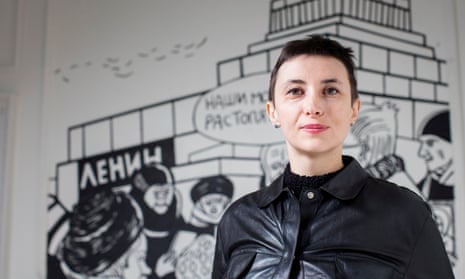In Memory of Memory by Maria Stepanova
(Fitzcarraldo Editions, translated by Sasha Dugdale)
Out in translation this week, Stepanova’s tour de force blends memoir, literary criticism, essay and fiction. Although this is a personal and intimate work using photographs, postcards and diaries, it succeeds in mining a universal theme in contemporary Russian cultural life: how does a family – or a country – process the events of the past 100 years? Author of 10 volumes of poetry, Stepanova is the founder and editor-in-chief of independent online crowd-sourced journal colta.ru which reaches a million readers a month.
Happiness Is Possible by Oleg Zaionchkovsky
(And Other Stories, translated by Andrew Bromfield)
Published in Russia in 2010 (and in translation in 2012), this is a rare novel about post-perestroika Moscow. (Most contemporary Russian novelists set their work in the recent or distant past, not in the present day.) Described as “Russia’s answer to Murakami”, Zaionchkovsky analyses the fate of an introspective writer who can’t finish the book he’s writing because he is feeling “newly orphaned” by the collapse of his marriage and tortured by the cramped conditions in his high-rise apartment (“I am – pardon the comparison – like a sanitary towel absorbing other people’s intimacies”). AD Miller, author of the Booker-shortlisted Snowdrops, says Zaionchkovsky has “an identifiably Russian, dark sense of humour”.
Bride and Groom by Alisa Ganieva
(Deep Vellum, translated by Carol Apollionio)
Now in her mid-30s, Ganieva is a Russian-Dagestani author famous for winning Russia’s Debut prize at the age of 25. The winning entry was her first novel Salaam, Dalgat!, written and submitted for the prize under a male pseudonym. Her identity was only revealed at the award ceremony. Bride and Groom, the tale of a young couple torn between the drive for freedom and the respect of their families, is sensitive, compelling and funny: there’s an uncle sent to the camps for boasting that his penis is more powerful than Stalin himself, and a grandmother who tells the bride-to-be to use Elastoplast to avoid nose wrinkles.
Other Russias: Stories and Drawings from the Age of Putin by Victoria Lomasko
(Penguin, translated by Thomas Campbell)
A cross between “guerrilla journalism”, post-Soviet Charlie Hebdo and a one-woman Private Eye, this is a collection of drawings and observations by artist and activist Victoria Lomasko. The daughter of a Soviet propaganda artist, Lomasko aims to show “the unseen Russia” through the eyes of sex workers, juvenile prisoners, elderly Orthodox believers, the socially isolated and campaigners affected by Russia’s homophobic laws. She began the series of drawings in 2008 but many of the slogans she reports were echoed in the recent 2021 Navalny protests: “Retire, Putin.” “Mother of God, drive Putin away.”
The Return of the Russian Leviathan by Sergei Medvedev
(Polity, translated by Stephen Dalziel)
A professor at the Higher School of Economics in Moscow, Medvedev runs a popular daily blog for an audience of 30,000, writing about “the triangle between history, politics and sociology”. Russian readers lapped up this book: it’s in its sixth reprint. Awarded the 2020 Pushkin prize (“to encourage public understanding and intelligent debate about the Russian-speaking world”), this book traces the origins of Russian nationalism and investigates the nostalgia for empire. The Pushkin prize is always a reliable source of both authoritative and offbeat reading suggestions: the 2021 shortlist will be announced later this spring.
